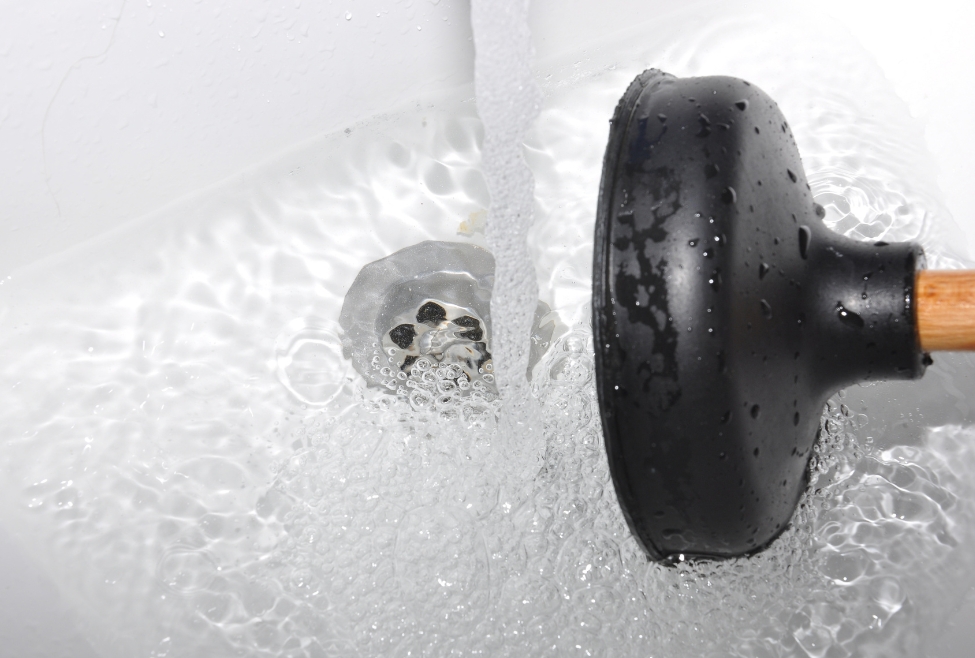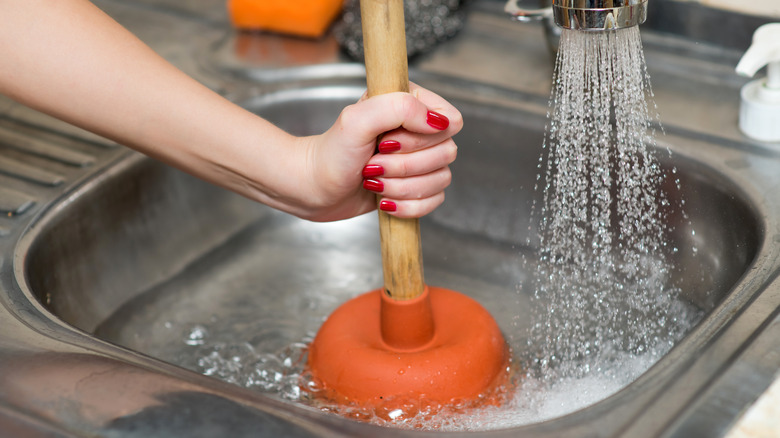Ways To Quickly Resolve A Slow-Draining Sink
Ways To Quickly Resolve A Slow-Draining Sink
Blog Article
We've stumbled on the article involving Solved! How to Fix a Slow Sink Drain below on the internet and believe it made sense to share it with you on my blog.

Intro
We've all existed: You're brushing your teeth or cleaning your hands, and you see the water pooling in the sink. As opposed to rapidly swirling away, it lingers, transforming your once-refreshing morning routine right into a miniature swamp scene. A slow-draining sink isn't simply frustrating; it's frequently an indicator of bigger plumbing problems prowling beneath the surface. Fortunately is that the majority of slow-draining sinks can be fixed with a little know-how, a few basic tools, and some persistence. Prepared to tackle this job head-on? Allow's roll up our sleeves and dive right in.
Recognizing the Sources Of a Slow-Draining Sink
Prior to you start poking around in your pipelines, it helps to recognize what could be causing the stagnation. Comprehending the source makes it much easier to choose the best fix.
Devices and Materials You'll Require
The right devices make all the distinction. Fortunately, you will not need a completely stocked plumbing technician's van to get the job done.
Step-by-Step Overview to Taking Care Of a Slow-Draining Sink
Now, let's enter the nitty-gritty. This step-by-step procedure will certainly assist you via easy methods to recover your sink's drain.
Action 1: Eliminate and Clean the Stopper
Typically, the stopper (that small plug you push down to block water) is the first wrongdoer. Remove it thoroughly and clean off any hair or substance entraped around its base. Wash it completely prior to putting it back in position.
Step 2: Use a Bettor to Displace Particles
Got that plunger prepared? Setting it over the drainpipe and provide it a few firm pumps. The idea is to develop suction that can loosen up any kind of obstruction. If you see little bits of debris floating up, you're on the right track.
Action 3: Try a Drain Serpent or Cable Hanger
If the bettor doesn't do the trick, it's time to bring out the drainpipe serpent. Gently feed it right into the drain and spin as you go. You could really feel some resistance-- that's likely the clog. Maintain turning and drawing until you remove the obstruction. If you don't have a drain snake, a corrected cable wall mount can work in a pinch.
Tip 4: Use a DIY Drainpipe Cleanser
A natural cleaner made from baking soft drink and vinegar can break down recurring grime. Pour half a cup of cooking soda right into the drainpipe, followed by half a cup of vinegar. Allow it fizz for around 15 minutes, after that flush with warm water. This chemical reaction typically does marvels for small clogs.
Step 5: Reassemble and Test the Sink
Put every little thing back with each other and run the faucet. Does the water currently swirl down the drain at a respectable speed? If yes, provide on your own a pat on the back. If not, do not anguish-- there are still a few more tricks up your sleeve.
Crucial Tools for DIY Repair Works
A plunger is your best starting point. A tiny, sink-sized bettor develops suction that can dislodge small blockages. For more persistent blockages, a drainpipe serpent (sometimes called a plumbing's auger) works marvels. A set of handwear covers, a flashlight, and possibly a set of safety goggles are additionally convenient.
Recommended Cleansing Solutions
Light recipe soap and warm water can aid break down oily build-up. A combination of baking soda and vinegar is a tried and true natural home remedy, and chemical cleansers provide an even more environment-friendly method. Maintain chemical drainpipe cleansers as a last option, as they can be rough on your pipelines.
Usual Wrongdoers Behind Slow Water Drainage
So, what's obstructing things up? Commonly, it's a mix of daily debris-- believe hair, soap scum, toothpaste deposit, and leftover food bits. With time, these tiny bits build up and hold on to the pipe walls, slowly tightening the flow and making it harder for water to go through. In many cases, natural resource from difficult water can additionally add to the gunk, creating the excellent tornado for stubborn blockages.
When is it Time to Act?
If you discover the water draining pipes slower than usual, it's an excellent idea to interfere sooner instead of later. Waiting too long might bring about complete obstructions, undesirable smells, and even pipeline damages. If the water takes greater than a couple of seconds to clear out after turning off the tap, consider it a red flag and get ready to put on your do it yourself hat.
Safety First: Safety Measures and Preparations
Before you launch into unclogging setting, think about safety and security. You're managing possibly dirty water and debris, so slip on a set of gloves. If you're making use of chemical cleaners, make certain the space is well-ventilated and comply with the instructions on the tag.
Protective Gear and Workspace Setup
Lay down some old towels or rags around the sink location to catch sprinkles. Clear away any things that may enter your means, like soap dispensers or tooth brush holders. Make sure you have great illumination-- order a flashlight if needed.
Different Approaches for Stubborn Clogs
Not all clogs are developed equivalent. If your sink still rejects to comply, take into consideration these alternate remedies.
Baking Soda and Vinegar Approach
We already discussed this, but it deserves noting once again. This gentle, green method is more secure than chemical cleaners and often rather efficient.
Enzymatic Drainpipe Cleaners
Enzyme-based cleansers utilize all-natural germs to digest organic matter. They're an exceptional choice if you're aiming to prevent severe chemicals. Simply remember, they may take a bit longer to function their magic.
Chemical Drain Cleaning Company: Benefits And Drawbacks
Chemical cleaners can blast with hard clogs fast, but they're not without disadvantages. They can produce heat and fumes, damage pipes if made use of exceedingly, and pose environmental risks. Use them moderately, and constantly comply with the instructions carefully.
Preventive Measures to Maintain Your Sink Flowing
Avoidance is the most effective remedy. By adopting a couple of simple routines, you can maintain your sink from slowing down in the first place.
Routine Cleansing Habits
Wipe down the sink basin and fixture area on a regular basis. Eliminate hair or food fragments before they have a possibility to wash down the drain.
Staying Clear Of Hazardous Materials Away
Hesitate before unloading coffee premises, grease, or coarse vegetable scraps down the sink. These wrongdoers cling to pipeline walls, creating obstructions with time.
Routine Maintenance Checks
Arrange a fast month-to-month inspection. Run warm water via the sink for a few minutes, taking notice of the flow. If it appears slow-moving, act quick prior to it ends up being a full-blown clog.
When to Call a Specialist Plumbing Professional
Sometimes, regardless of how hard you try, that clog just will not move. That's when it's time to bring in the pros.
Indicators That Indicate an Extra Major Issue
If your sink drains gradually regardless of several attempts, or if you see water backing up in various other fixtures (like your shower or toilet), you might have a much more serious pipes problem lurking much deeper in the system.
Balancing Do It Yourself Efforts with Expert Aid
While DIY can conserve you cash and offer a feeling of accomplishment, there's no embarassment in calling a professional. A professional plumber can analyze your entire plumbing setup, making sure there's no underlying damages or lasting issue that might cost you a lot more down the road.
Contrasting Costs and Long-Term Solutions
Prior to making a decision, think about the big picture. An economical, quick fix might resolve the issue temporarily, but investing in a much more long-term service can conserve you cash and anxiety over time.
Evaluating the Expenses of Do It Yourself vs. Specialist Fixes
Do it yourself solutions often set you back bit more than the rate of a plunger or a bottle of cooking soft drink. Expert services, on the other hand, featured a cost however may protect against repeated concerns and expensive repairs later on.
Investing in Quality Fixtures and Upgrades
If your sink's layout contributes to constant clogs, it could be worth updating to higher-quality fixtures or changing the plumbing format. Consider this a financial investment in your house's capability and convenience.
Verdict
A slow-draining sink can seem like a small inflammation, yet it's frequently a sign that your plumbing requires a little tender loving care. By recognizing the source, employing the right devices and methods, and committing to straightforward preventive measures, you can keep your sink flowing freely. And when all else falls short, never ever think twice to call in a specialist-- your home's plumbing deserves the investment in treatment and upkeep.
Three Common Ways to Fix a Slow Drain
Baking Soda Method
Boil a full pot of water. Measure out cup of baking soda and pour it down the drain. Then take cup of the magical cleansing substance known as white vinegar and drop that down there too. Allow the mixture to fizz in the drain for five minutes as the vinegar and baking soda combine. Now dump in that whole pot of boiling water. This combination of cleaning substances should clear out anything that is causing your sink to drain slowly. If it doesn t...
Zip-It
If the baking soda method doesn t clear out your drain, it may be because a significant amount of hair and/or other debris has collected there and you need to remove it. Purchase a Zip-It tool at any home improvement or hardware store and insert it into your drain. It will catch any collected hair or debris that s blocking the flow of water. Pull it out. If it s got a big clump of hair, etc. on the end, you ve probably got your culprit.
Drain Cleaner
If these methods don t work, there is the standard drain cleaner that you can also buy in a hardware store or even your local grocery store. It s better if you can use a household solution, but these drain cleaners often work in a pinch. They re very simple to use. You generally just dump them in your drain and wait. If even this method is not effective, it may be time to call the plumber.
https://www.mrrooter.com/oneida/about-us/blog/2017/july/three-common-ways-to-fix-a-slow-drain/

I'm very interested in Solved! How to Fix a Slow Sink Drain and I really hope you liked our blog entry. Feel free to take the time to distribute this entry if you liked it. We enjoy your readership.
This Site Report this page